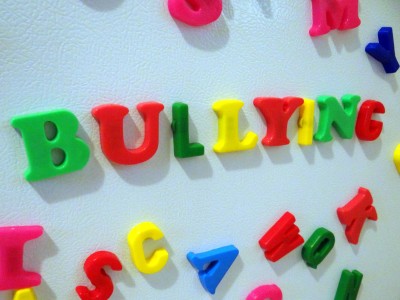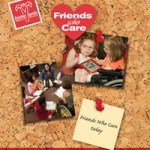Don’t let bullies take away any part of who you are
by Erin
 I am pleased to introduce Elsa S. Henry as a guest blogger today. Elsa is a disability activist and intersectional feminist writer who heads Feminist Sonar and serves as disability access coordinator for multiple gaming conventions around the United States. A fiction writer and game designer, she enjoys long walks with her service hound and board games with her husband.
I am pleased to introduce Elsa S. Henry as a guest blogger today. Elsa is a disability activist and intersectional feminist writer who heads Feminist Sonar and serves as disability access coordinator for multiple gaming conventions around the United States. A fiction writer and game designer, she enjoys long walks with her service hound and board games with her husband.
by Elsa S. Henry
Hi, my name is Elsa and I was bullied when I was a kid.
I’m blind in one eye with a cataract (they called me a witch a lot), and deaf in one ear (and the bullies whistled into it all the time.)
I want to make something clear, and it’s something that not everyone is going to tell you. Truth is, not everyone is going to grow up and stop being a bully. There are people out there who are always going to make fun of you for being who you are, and that’s not okay. But what I can tell you is what I learned from giving in to the bullies rather than standing up for myself.
See, when I was in middle school, I stopped wearing my hearing aid.
My hearing aid was purple and see through, and I thought it was a super cool mechanical device — but my classmates would whistle into it. They would yell into my right ear. They would do all sorts of things that engaged with my hearing aid in a way that hurt me emotionally and physically (if you wear a hearing aid, you might remember the awful feedback sounds that aids from the 90s would make, especially when someone would come up close to the side of your head).
They’d also whisper gross things into my ear, then giggle and ask “Did you hear that?”
I got tired of all the bullying, but I didn’t want to go to the teachers because I thought there was nothing they could do. Instead, I stopped wearing my hearing aid, and the bullies stopped whistling into it – because it wasn’t there anymore.
I don’t see this as the bullies winning. I just see it as me losing. In response to pressure and hurt, I gave up on hearing the world the way my peers do. In the end, what I want you to remember from my story is that you should never let people take away a part of who you are and how you interact with the world just because you are scared.
We as a society need to do better. Parents need to help their kids and their kids’ teachers understand what an adaptive device is, and why you shouldn’t play with it or take it out. I think a lot of the bullying I received could have been solved if we had a better understanding of what the aid was used for. If teachers had better ways to talk about adaptive devices as tools, maybe it wouldn’t have been as easy for those devices to be seen as open territory for teasing.
Something else that would have helped me a lot is the idea of knowing adults with disabilities — people who could have shown me that growing up and having a life is possible and that I would find allies who could teach me the tricks of my disabilities. Maybe if I’d been introduced to an adult with a disability like mine they could have helped me better understand my needs and help me know that, later on in life, people wouldn’t bully me on a daily basis. That would have helped, too.
I write today as a person who is once again wearing a hearing aid. At first I was terrified to get another one. I was fearful that people would hurt me again just because they could. But I’m happy to report that I have not had a single person try to deliberately hurt me with my hearing aid. I’ve had my aid for 4 years and counting, and not a day goes by that I don’t regret having taken my hearing aid out in order to survive middle school.
We have to do better by our teens and tweens – we have to give everyone the chance to grow up with their adaptive devices in place, and to do so without fear.
It doesn’t get better just because you grow up, but it will get better if we change the way these things get handled.
So let’s do better.
![]() Resources for Young Women with Disabilities:
Resources for Young Women with Disabilities:
Tell young women with disabilities about Easter Seals Thrive, an online support network and inspirational source of content. Thrive also features a Thrive Tumblr page with Letters to Thrive, which are letters to younger selves to show today’s young women that it does get better. Check Letters to Thrive out!
 For parents of school-age children, download this free curriculum for teachers and students on understanding disability and acceptance, available thanks to our friends at Friendly’s.
For parents of school-age children, download this free curriculum for teachers and students on understanding disability and acceptance, available thanks to our friends at Friendly’s.







